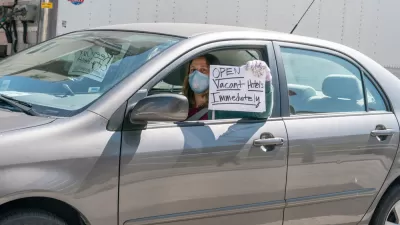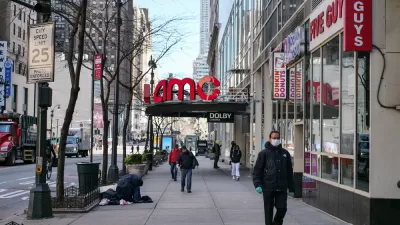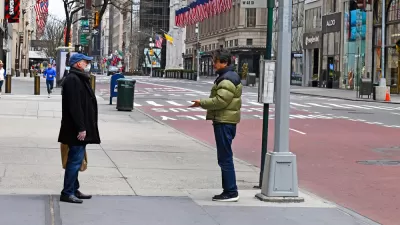Cities and counties have been slow to take advantage of the promise of full and retroactive FEMA reimbursement to expand emergency housing programs, frustrating housing advocates. What’s getting in the way?

Over the last year, thousands of unhoused and vulnerable people have moved from the streets or congregate spaces into hotel and motel rooms thanks to a bevy of emergency housing programs aimed at reducing the spread of COVID-19. Shelterforce recently wrote about how these programs worked, and why some local governments were now purchasing hotels for long-term housing.
Though the need is still great, some of these emergency housing programs are winding down due to funding issues.
FEMA had been reimbursing cities, counties, and states 75 percent of the cost for COVID-related non-congregate shelter, but once other sources of funding ran out—like those provided by the federal CARES Act—local governments opted to shutter their hotel and motel lease programs.
There was cause for celebration earlier this year when the Biden administration announced that FEMA would provide 100 percent reimbursement for non-congregate shelter, retroactive to the start of the pandemic and through Sept. 30, 2021. Advocates said the move would make a major difference in the availability of COVID-safe shelter. “It will enable states and communities to address the urgent health and housing needs of people experiencing homelessness and other residents of congregate facilities during the pandemic,” the National Low Income Housing Coalition said in a statement after the announcement.
But cities and counties have so far been slow to take advantage of the promise of full and retroactive reimbursement to expand these emergency programs, frustrating many housing advocates. According to an investigation by Grist, only 23 local governments have submitted funding requests as of early April. What’s getting in the way?
FEMA Fears
It turns out several things are, among them the fact that ...
FULL STORY: FEMA Offers Full Reimbursement for Pandemic Shelter Costs—But Cities Are Still Jittery

Alabama: Trump Terminates Settlements for Black Communities Harmed By Raw Sewage
Trump deemed the landmark civil rights agreement “illegal DEI and environmental justice policy.”

Study: Maui’s Plan to Convert Vacation Rentals to Long-Term Housing Could Cause Nearly $1 Billion Economic Loss
The plan would reduce visitor accommodation by 25% resulting in 1,900 jobs lost.

Planetizen Federal Action Tracker
A weekly monitor of how Trump’s orders and actions are impacting planners and planning in America.

Baltimore Ordered to Improve Sidewalk Accessibility
The city is one of many to face lawsuits for failing to comply with the Americans with Disabilities Act.

This Toronto Suburb Has More Bus Riders Than Columbus, Ohio
Brampton, Ontario used gradual improvements in service to prove that if you build it, they will ride.

Paris Bike Boom Leads to Steep Drop in Air Pollution
The French city’s air quality has improved dramatically in the past 20 years, coinciding with a growth in cycling.
Urban Design for Planners 1: Software Tools
This six-course series explores essential urban design concepts using open source software and equips planners with the tools they need to participate fully in the urban design process.
Planning for Universal Design
Learn the tools for implementing Universal Design in planning regulations.
Smith Gee Studio
Alamo Area Metropolitan Planning Organization
City of Santa Clarita
Institute for Housing and Urban Development Studies (IHS)
City of Grandview
Harvard GSD Executive Education
Toledo-Lucas County Plan Commissions
Salt Lake City
NYU Wagner Graduate School of Public Service





























